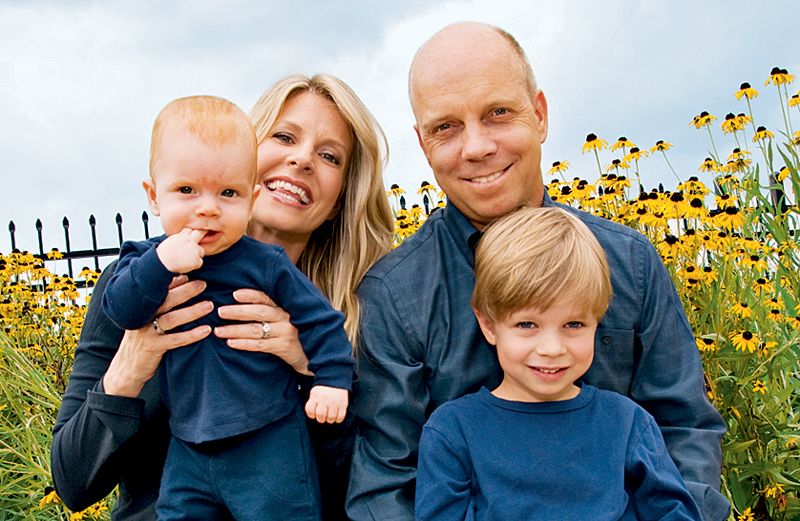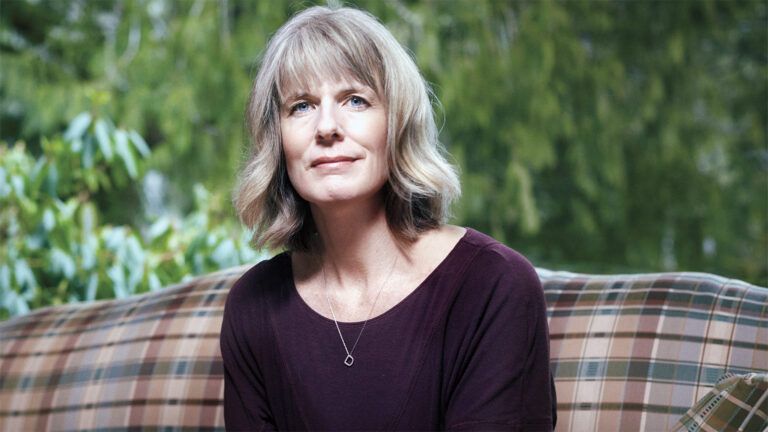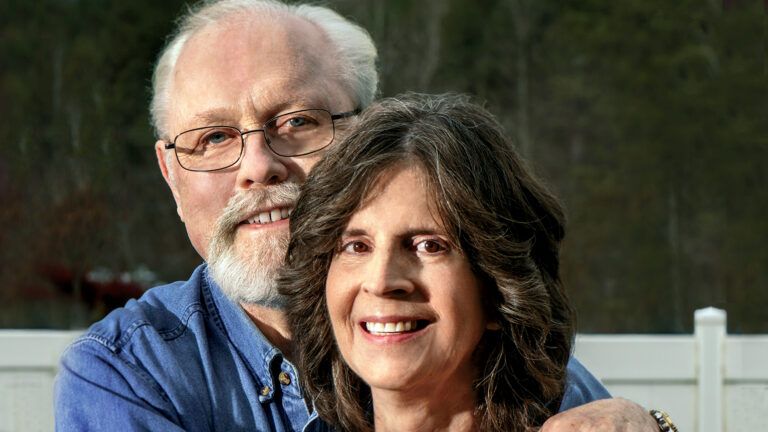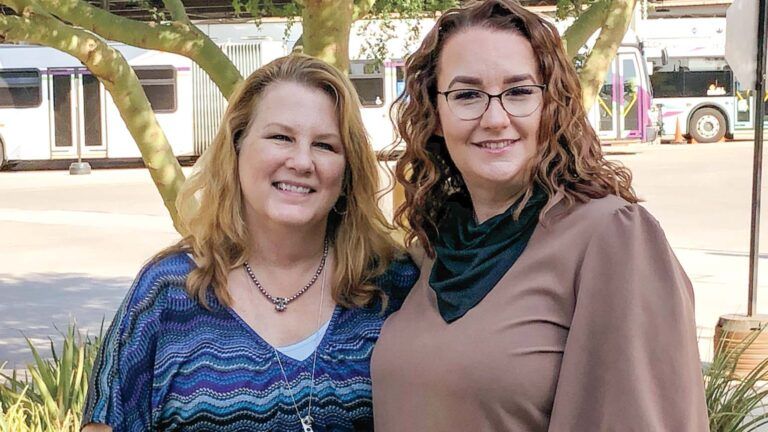I skated out to center stage, or rather center ice, 10,000 people cheering me on at The Forum in L.A. I know it sounds hammy, but I’m a performer, and all my life center stage is where I’ve wanted to be. This was my comeback performance–my comeback from testicular cancer.
Everyone, including me, wanted to see if I was as good as I’d been before the cancer. It had been 14 years since I won the gold medal at the Sarajevo Olympics. My own expectations were probably higher than they should’ve been.
I waited for my friend, country music singer Gary Morris, to begin singing “With One More Look at You.” I chose it as a tribute to my mother, Dorothy. She died of breast cancer when I was in high school. Everything I knew about courage and determination, I owed to her.
Gary started singing. I launched into my routine. Within the first minute, I realized how tough this was going to be. My body felt different. Logy, weak. It had been just five and a half months since my chemo, four months since major surgery. It was like I had no leg muscles at all.
I was determined, though. The show must go on. All my skating friends were there, in tribute. Kristi Yamaguchi, Brian Boitano, so many others. CBS-TV was doing a special broadcast.
I gathered myself and, as the music reached a crescendo, I flew into my signature jump, a triple toe loop. Somewhere in midair I lost control. Next thing I knew, I was flat on the ice. The crowd hushed. Gary paused.
In my head I could hear my mother say, You’ve got to keep going. That would have been just like Mom, always urging me to do my best. Especially when it came to my skating.
From the very first day I laced up skates when I was nine, I loved it. I glided to the center of the rink and waited for the music. “Look at him go,” the kids from school said. I ate up the attention. I loved showing what I could do.
I was too small to be good at any other sport. On the ball field, I was always the last one chosen. Skating, though, was different. I didn’t have to be bigger or stronger or faster. Just myself.
By middle school, I was winning events and gearing up for the Junior Nationals. Mom was very involved, always looking out for my best interests. “You can be as good as you want,” she said. “If you make the commitment, we’ll make the commitment with you.”
“Okay, Mom,” I said, not even sure what she meant.
Next morning Mom woke me at 5:30. “Ready?” she asked. She drove me to the skating rink, then sat on the sidelines and watched, peeking at her lesson book. Mom was a second-grade teacher. But she had other plans.
“I’m going back to school,” she told my dad. “Scott has a real chance to do something special, and the only way we can afford to pay for his coach and ice time and equipment and all of his travel to competitions is for me to get a better-paying job.”
Evenings, after teaching all day, after fixing dinner, she studied for her master’s degree in education. She parlayed it into an associate professorship in family relations at Bowling Green, where Dad was a biology professor.
Even that wasn’t enough. The more I advanced, the more coaching and training I needed. She convinced Dad to sell our house and move to a smaller one out in the country. One spring morning I found her and Dad digging up the backyard.
“What are you doing?” I asked.
“I’m planting lettuce, tomatoes, cucumbers–a vegetable garden,” Mom replied. She did it to save money–money she used to pay for more ice time and more lessons for me.
I was young and self-absorbed, and didn’t think too much about it. Skating came so easily. Maybe too easily. I kept winning competitions, but didn’t always train as hard as I should have.
Then Mom got sick. Doctors found a lump in her breast. When Dad brought her home and they told us the diagnosis, I could see in her eyes that she was scared. But her voice was firm. “I’m going to beat this. Don’t worry,” she said. I was 15 years old, a sophomore in high school.
Me, I would have been a quivering mess. But Mom was so positive. She acted like cancer, chemo and surgery were opportunities to finally do all the things she’d wanted to do. When chemo made her hair fall out, she happily got wigs.
“It was such a pain to have my hair done all the time,” she said. The chemo also killed her appetite. She lost weight and showed off her new figure to her friends, telling everyone how great she looked. But she never let a soul see her pain.
The last time she saw me compete was at the 1977 U.S. Senior Figure Skating Championships, my first year at the senior level. I went out and laid an egg–I dropped to ninth after the free skate, my strongest event.
My new coach, Carlo Fassi, couldn’t get me to focus and work hard. I was more into hanging out with my friends. But that day when I looked to my mother in the grandstand, I could see the disappointment in her eyes.
The day Mom died I went for a long walk. I was angry and feeling sorry for myself. My prayers were all complaints: “God, why did you do this to me? I’m too young to lose my mother.” What was I going to do now? How could I go on?
But then I thought about how Mom dealt with her cancer. She never complained. She never gave up. Instead, she made the most of every minute God gave her. Wasn’t that a challenge I had to take up now?
The first thing after Mom’s funeral, my coach called to express his sympathy. “Carlo,” I said, “I want you to know that a different person is coming back to you to train. He is going to be totally dedicated to being the best he can be.”
Carlo was skeptical. But from then on, it was like Mom was still urging me on. I went to bed early. I ate properly. I didn’t waste a moment on the ice. There was no quit in me.
I worked till I got things right. Four hours a day on compulsory figures. Two hours a day on my free skate. Weightlifting two or three times a week.
By the time the 1984 Sarajevo Olympics rolled around, I was in the best shape of my life. I was ready. And when the competition was over, I stood atop the podium listening to our national anthem. My first thought during the ceremony was, Mom, without you, this would never have happened.
The Olympics opened doors. It made life as a professional skater possible, and I went at my pro career with the same intensity as my run-up to the Olympics. If I wasn’t working every week, I felt like I was letting Mom down.
With my skating friends I launched a series of ice shows that played 70 cities a year. It was hugely successful.
Then, on tour in 1997, I felt a pain in my abdomen. I pushed my belly button and it changed shape a little bit. It had this odd feeling. I couldn’t describe it.
All I knew was it didn’t feel normal. My stamina slipped. I told myself that it was an ulcer. Or maybe I was just burned out. At the end of the tour I’d get it checked out. But the pain got worse. One afternoon in Peoria, Illinois, I couldn’t straighten up.
A few hours before the show that night, I went to the emergency room. The doctor asked me a ton of questions and ran a battery of tests. Then he sat me down. “We’ve found a mass,” he said. “You need to take care of this right away.”
I did the show that night and made sure it was great. I was afraid it would be my last show ever. The next morning I checked into the Cleveland Clinic Taussig Cancer Institute.
This is going to be the biggest battle you’ve ever faced, I told myself. I would need to hold on to the faith and determination I found after Mom’s death. Fighting cancer, she had taught me how to live.
When the doctors returned with my diagnosis–testicular cancer–I was ready. “Let’s get started,” I said. “I have a skating tour in the fall.”
“You may want to reconsider,” one doctor said. “Chemotherapy and surgery take a lot out of you. It will be a while before you can get back to your life.”
“You don’t understand,” I told them. “I determine what I do, not this cancer.” It’s exactly what Mom would have said.
The chemo and surgery were rough, I’m not going to kid you. But I had this attitude: Cancer likes darkness; it doesn’t like light. And I was going to attack it with all the light I possibly could. I prayed. I surrounded myself with good friends, I watched videos and read books that made me laugh.
When I woke up in the recovery room after surgery, totally free of cancer, I felt like my life had just begun.
That’s what had led me to that comeback night at The Forum in L.A., and here I was, splayed on the ice. But not for long.
The audience began to applaud. The sound grew louder and louder–the kind of cheering I heard at Sarajevo. There was only one thing to do. Get up. I popped to my feet and went back to my routine. A smile lit my face that just wouldn’t go away.
I could fall again, I might get sick again. That didn’t matter. What mattered was making the most of what I’d been given.
Go for it, I thought. I flew across the ice, leaped as high as I could and landed a perfect double axel. Then another. I felt like the night needed to end with an exclamation mark, so I did several back flips. Mom would have been so proud. She was always my biggest fan.
More Winter Olympics!
Download your FREE ebook, True Inspirational Stories: 9 Real Life Stories of Hope & Faith.





